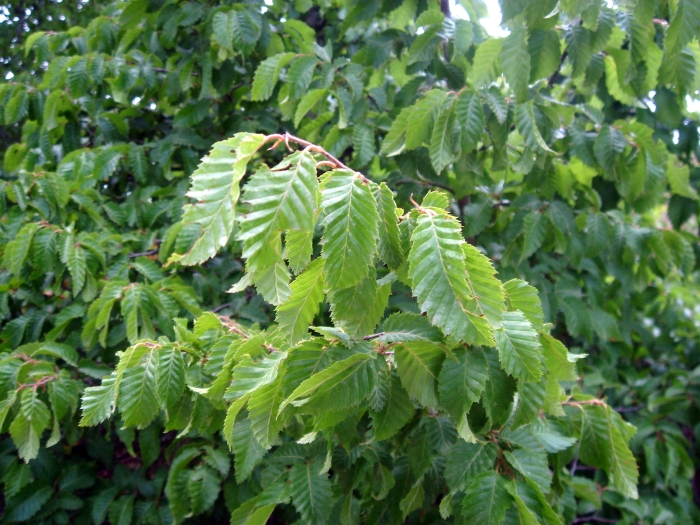Oriental Hornbeam
(Carpinus orientalis)
Oriental Hornbeam (Carpinus orientalis)
/
/

Karduelis
Public domain
Image By:
Karduelis
Recorded By:
Copyright:
Public domain
Copyright Notice:
Photo by: Karduelis | License Type: Public domain | License URL: http://creativecommons.org/publicdomain/zero/1.0/deed.en | Uploader: Karduelis | Publisher: Wikipedia Commons |













































Estimated Native Range
Summary
Carpinus orientalis, commonly known as Oriental Hornbeam, is a deciduous tree or large shrub native to the understory of deciduous forests and woodland edges in Southeastern Europe, the Transcaucasus, and the Middle East. It typically grows to a height of 15-25 feet (4.5-7.6 meters) and a width of 15-20 feet (4.5-6 meters), often taking on a multi-stemmed, shrubby form. The Oriental Hornbeam features a fluted gray trunk and branches with ovate, serrated leaves that turn yellow in the fall, providing seasonal interest. In spring, it produces inconspicuous yellow and green catkins, which are followed by small nutlets that are a food source for wildlife.
The Oriental Hornbeam is valued for its adaptability to different light conditions and its use in shaded gardens where other trees may struggle. It is suitable for urban planting, as a hedge or screen, and in naturalized areas. This species requires medium amounts of water and thrives in soils with medium drainage. It is tolerant of a range of soil types, including clay, and prefers a cool, moist root zone. While it is not particularly prone to diseases, it can suffer from leaf spot and canker in poor conditions. The Oriental Hornbeam is not known for aggressive roots or significant invasiveness issues.CC BY-SA 4.0
The Oriental Hornbeam is valued for its adaptability to different light conditions and its use in shaded gardens where other trees may struggle. It is suitable for urban planting, as a hedge or screen, and in naturalized areas. This species requires medium amounts of water and thrives in soils with medium drainage. It is tolerant of a range of soil types, including clay, and prefers a cool, moist root zone. While it is not particularly prone to diseases, it can suffer from leaf spot and canker in poor conditions. The Oriental Hornbeam is not known for aggressive roots or significant invasiveness issues.CC BY-SA 4.0
Plant Description
- Plant Type: Tree
- Height: 15-25 feet
- Width: 15-20 feet
- Growth Rate: Slow
- Flower Color: Yellow, Green
- Flowering Season: Spring
- Leaf Retention: Deciduous
Growth Requirements
- Sun: Part Shade, Full Shade
- Water: Medium
- Drainage: Medium
Common Uses
Bird Garden, Butterfly Garden, Drought Tolerant, Hedges, Low Maintenance
Natural Habitat
Understory of deciduous forests and woodland edges
Other Names
Common Names: Orientalisk Avenbok
Scientific Names: , Carpinus orientalis, Carpinus macrocarpa, Carpinus nigra,
GBIF Accepted Name: Carpinus orientalis Mill.